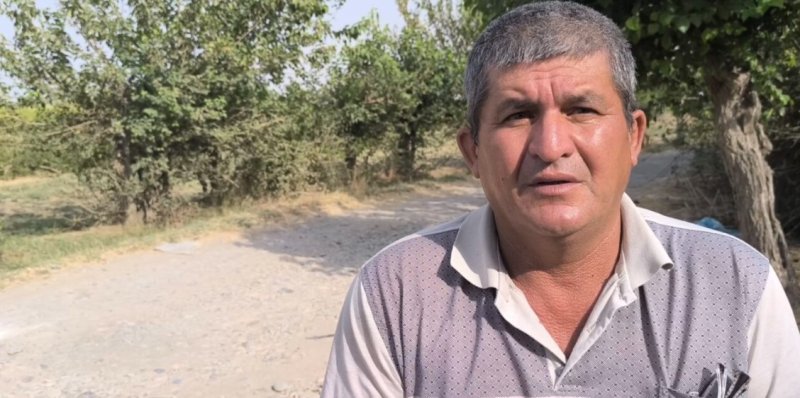Countries
Solidarity campaigns
UZBEK FARMER: “I WOULD LIKE THE TRUTH TO BE TOLD.”

“Before I begin this interview, I want to say that if I am alive tomorrow, or if I am arrested tomorrow, or if I disappear, the responsibility for this will lie with the hokim of Shakhrisabz district, Samad Khasanov. He is to blame for my despair. If I die tomorrow, I would like the truth to be told.”
Uzbek Forum spoke with Shavkat Kudratov, a farmer from Shakhrisabz district in Kashkadarya region, who described the desperate situation he found himself in after writing critical posts about the hokim [local governor] of the Shakhrisabz district, Samad Khasanov. The hokim declared a vendetta against the farmer, ordering that no water be given to irrigate his grain and cotton fields, which led to a partial loss of his grain crop and debts for the farmer.
In February this year, Shavkat Kudratov wrote an emotional post in a dedicated farmers Telegram group after learning about the suicide of Dilshod Sattorov, a farmer he knew well who also lived in the same district. Kudratov wrote that Dilshod Sattorov, who hanged himself at his own home, could not withstand the threats and public insults, and that many farmers witnessed how the hokim Samadov insulted and scolded Sattorov at a meeting in the hokimiyat [local administration].
Shavkat Kudratov was not the only one who accused the hokim of causing the farmer’s suicide. On the day of her father’s death, Dilshod Sattorov’s daughter wrote several posts about how her father could not bear the public insults. A few days later, she deleted her posts, but screenshots of her entries remain.
Kudratov told Uzbek Forum that many farmers are afraid to complain, while the hokim engages in falsifying cotton yields and extorts farmers for grain who are growing other crops on their land. Although the law stipulates that farmers can use 10% of their land to grow other crops, the hokim demands that disctrict farmers grow only cotton and grain.
“This year, by order of the hokim, I did not receive a single drop of water to irrigate my wheat, resulting in a failed crop. I received water for irrigating cotton only once, and now I don’t know if I will be able to meet the cotton quota [stipulated in land leases].”
The problems did not end there. The farmer said that on May 25, 2025, traffic police officers came to his home with a truck and confiscated his car without presenting any documents. The police officers said they had received an order from the hokim to confiscate the car because the farmer had not met his quota for silkworm cocoons. The police, who took the farmer’s car away in front of dozens of neighbors, refused to give the farmer any document ordering the confiscation and justified their actions based on an verbal order from the hokim Khasanov.
Coercion to produce silkworm cocoons
Every year, farmers in Uzbekistan are forced to grow silkworm cocoons which are listed by the US Department of Labor as a product made using forced labor.
“Growing silkworm cocoons is compulsory for all farmers, even though there is no legal basis for it,” said Kudratov. “At the beginning of the year, I was forced to sign a contract to grow 60 kg of cocoons, which I gave to the villagers to cultivate. The cocoon growing season coincides with the busiest period of cotton cultivation, so farmers often ask the residents of the mahalla to grow the cocoons instead. I grew cocoons last year and the year before, but I never received payment from the cluster, so I told the worker who grows the cocoons that if the silk cluster does not pay the debts for previous years, then the worker can sell the cocoons at his discretion. That is why I did not hand over the cocoons to the cluster, which is a systematic debtor, said the farmer.
According to Kudratov, his confiscated car was purchased on a credit lease. He has already paid 50 million UZS (4,000 USD) and has to pay off the loan in installments every month. “After the car was confiscated, I accumulated debts for the last three months, and now “Autoleasing” is threatening to put the car up for auction. This way, I will lose both the car and the money I already paid”.
“The car was my ‘arms and legs’; I used it to transport workers. My field is far away, and now I have to walk there every day. Traffic police officers came to my house without any legal basis and took my car, insulting me and saying that I could complain to anyone I wanted. How should such actions by police officers be interpreted? When my car was confiscated, my daughter-in-law had just given birth to my grandson and we urgently needed to go to the hospital, but the ambulance was very late. In our circumstances, not having a car threatens the health of a newborn baby. Farmers who work in the fields from morning to night already have a very difficult life. Should they really have to suffer like this just because I speak and write the truth?
Many farmers are tired of injustice, but they are afraid to speak out. I don’t know what might happen to me tomorrow, but if I am put in prison or disappear, consider the hokim of the Shahrisabz district, Samad Khasanov, responsible for it”, said Kudratov.
Uzbek Forum calls on the law enforcement agencies of Uzbekistan, as well as the Ministry of Agriculture, to conduct a thorough, prompt and transparent investigation into the actions of the hokim of the Shahrisabz district and provide assistance to the farmer.
Source: Uzbek Forum
